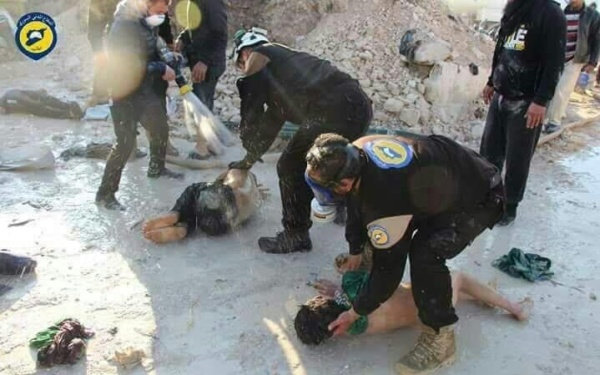White Helmets rescuers treat victims of the Assad regime’s sarin attack on Khan Sheikhoun in northwest Syria, April 4, 2017
Russia and China have refused to attend a UN Security Council meeting on chemical weapons in Syria.
Both countries boycotted the video conference on Tuesday. Russia’s UN Ambassador Vassily Nebenzia declared:
Regrettably, our Western partners, and their allies, insisted on holding this meeting behind closed doors in an informal setting despite the slogans of openness and transparency of the Security Council.
Such (an) approach is unacceptable to us as it undermines the prerogatives of State parties to the Chemical Weapons Convention.
Council members were briefed in the monthly meeting by the UN’s representative for disarmament affairs, Izumi Nakamitsu; the head of the Organization for the Prohibition of Chemical Weapons, Fernando Arias; and Santiago Onate-Laborde, the coordinator of the OPCW’s Investigation and Identification Team.
The UN’s diplomatic mission explainedin a statement that the session was in a closed format to allow Council members and the Syrian Arab Republic to exchange views frankly and ask questions to the briefers.”
Last month the IIT published its first report, concluding that the Assad regime had carried out sarin and chlorine attacks on the town of Lataminah in northwest Syria.
See also Syria Daily, April 9: OPCW Blames Assad Regime for Sarin and Chlorine Attacks in 2017
The UN officials said:
“A refusal to attend the meeting and engage with the OPCW on the substance of its findings is disappointing and indicative of the preference of some council members to undermine the prohibition on chemical weapons use by attacking the people and institutions charged with protecting it.
Protecting the Attacks
The Assad regime was supposed to dismantle its chemical weapons program after its sarin attacks on the East Ghouta region near Damascus in August 2013, killing more than 1,400 people.
However, the regime retained a small portion of its stock. It also used munitions filled with chlorine, which is not banned under the Chemical Weapons Convention.
UN and OPCW inspectors have found the regime culpable for 34 sarin and chlorine attacks from 2014 to 2018.
Working alongside pro-Assad activists, Russia has pursued diplomatic activity, propaganda, and disinformation to shield the regime.
In October 2017, the OPCW’s Joint Investigation Mechanism concluded that the regime attacked the town of Khan Sheikhoun in northwest Syria with sarin the previous April, killing about 90 people and wounding hundreds. Russia then used its Security Council veto to block the extension of the JIM’s mandate.
Moscow was unable to prevent OPCW member-states from creating the IIT in June 2018. So Russia, the Assad regime, and their supporters have vilified the OPCW with almost two years of denunciations.
The campaign includes a sustained attempt to deny a chlorine attack on Douma, near the Syrian capital Damascus, which killed 43 people in April 2018.
The IIT is due to report soon on the Douma assault.
See also Denying Syria’s Chemical Attacks, Attacking the Inspectors — The Douma Case

